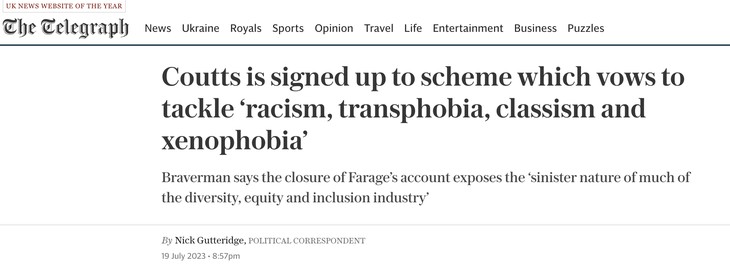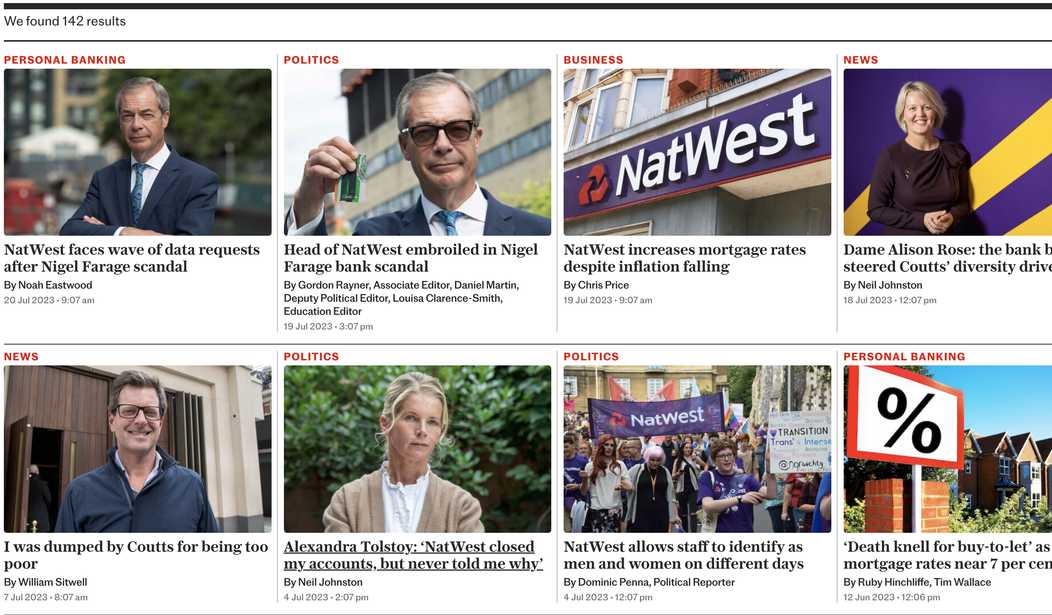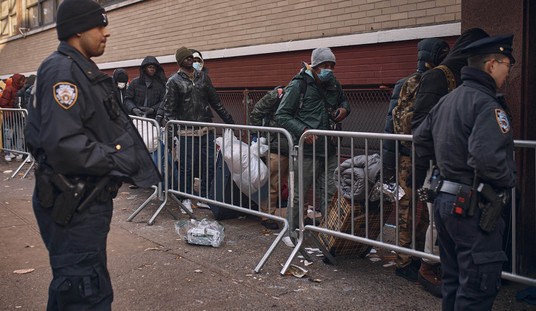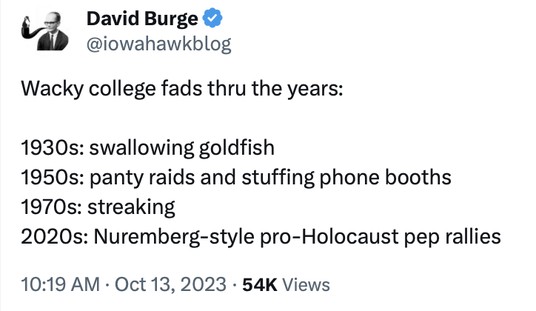A few weeks back I wrote about the UK banking system freezing out Nigel Farage by denying him the ability to have a bank account. At the time all the major banks had either kicked him out or denied him the right to do business with them.
It took a while, but the story has gotten legs in Great Britain, partly due to the lies told by the banks and partly due to the fact that it turns out that thousands of others have been given the same treatment; it’s just that Farage has a much larger megaphone to plead his case.
For those of you not in the know, Farage is a big deal in the UK. He more than anybody else made Brexit happen, and he founded UKIP, which is a fast-growing populist party (renamed the Brexit Party and now Reform UK) that is fighting back against the near uni-party running Great Britain. He is very much like a more refined Trump–you either love him or hate him–and as such is absolutely despised by the elite.
Farage has been fighting this battle for months, and it was only last month that he finally went public. Since then the banks and the BBC have been fighting back, making claims proven to be false, including that Farage has been denied service due to legitimate business reasons instead of politics. The bank that dropped him, Coutts, had given a background briefing to the BBC claiming that Farage did not have the financial resources to maintain a bank account. Politics had nothing to do with his account being closed. The BBC broadcast this as the real story.
Only it wasn’t true. At all. It was politics, and Farage has the receipts.
In Britain all citizens have the right to get an accounting of what documents a corporation has about their private information. Farage demanded this information, and, lo and behold, found that the bank had assembled a dossier on Farage disparaging his politics. They decided to drop him because his values “didn’t align” with theirs.
They name his climate change opinions, his alleged (but disproven) links to Russia, and his opposition to DEI/BLM as reasons to dump him.
They essentially used a social credit score to determine whether he could conduct business in Britain. The BBC has yet to retract its story and/or apologize for disparaging Mr. Farage, causing yet another scandal. The BBC allowed itself to be used to spread propaganda and are no backing down in the face of evidence.
Even liberals who despise Farage–one of whom hopes Farage goes to hell–see the danger in this.
It turns out that this is happening to people across Great Britain. There is a Facebook group where 10,000 members exchange advice on how to get their own information from corporations and strategies on how to cope with being tossed out of society by the banks.
NatWest faces a wave of demands from “debanked” customers to discover why they lost their accounts.
In a Facebook group of close to 10,000 people who claim to have had their NatWest accounts closed down, former customers are sharing templates and instructions on how to lodge Subject Access Requests with the institution.
It comes after Nigel Farage used the data protection right to obtain a dossier outlining the reasons behind Coutts’ decision to exit him as a customer.
The papers obtained, which Mr Farage described as a “36-page Stasi-style surveillance report” on his political views, revealed how the private bank, which forms part of the wider NatWest Group, chose to end its relationship with the prominent Brexiteer after deciding his views did not align with its values.
Other prominent figures are now also coming out with their own stories. This turns out to be a huge problem. Large enough that the government, which doesn’t exactly care for Farage itself, is being pushed to change the laws to prevent similar things from occurring. In fact, many are now suggesting that government regulatory actions are part of the problem.
The cancellation of Nigel Farage’s bank account at Coutts is not an isolated incident. It is rapidly coming to light that many from the Brexit side of the debate have been similarly treated – me included.
What perhaps is not yet widely appreciated is how this problem is not restricted to the banking sector. The prejudice which motivated Coutts has infected all regulated businesses. Indeed, it is born out of the regulatory framework. Coutts overstepped the mark, but it was behaving in accordance with regulatory encouragement.
Many commenting on the scandal have asked why the FCA did not step in to ensure Coutts treated all customers equally. The reason is that the FCA is part of the problem.
The virus goes by the name of Environmental Social and Governance (ESG). It is the policy mechanism by which governments across the developed world are requiring public bodies, institutions and businesses to drive towards Net Zero and eliminate social injustice. ESG has now firmly taken its place alongside the traditional drivers of the economy, and in many cases trumped them, including the vitally important profit motive.

Farage’s relatives have also been debanked, as well as political associates of his.
Relatives and associates of Nigel Farage have been refused bank accounts after being designated as politically exposed persons, or PEPs, the former Ukip leader has disclosed.
Mr Farage said someone close to him had been the subject of a “very nasty” account closure in the past fortnight and that others had been told they could not open accounts.
He said Coutts’s decision to close his personal and business accounts had left him “screwed” because he has been turned down as a customer by 10 other banks after having to tick a box saying he has been refused an account elsewhere.
Mr Farage has also dismissed as “a fable” claims by Coutts’s parent company NatWest that he was offered personal and business accounts with NatWest after being “exited” by the private bank.
After being told his accounts were being closed and convinced the decision was politically motivated, Mr Farage submitted subject access requests to Coutts and two companies which send them press cuttings and other information on customers, Lexis Nexus and Refinitiv.
As a result of their responses, Mr Farage discovered that a number of family members and associates, thought to be more than 10, were designated by the bank as PEPs, some of whom have now found it difficult to obtain banking facilities.
Mr Farage has always been protective of his family and private life and did not want to give details of who had been targeted.
But he told The Telegraph: “We have had several refusals to open accounts and a very nasty closure a couple of weeks ago.”
This is exactly the sort of thing that China does with its social credit system: your political allegiances determine what services you can get, and those who dissent from the prevailing political line will be denied the ability to do business in society. The mechanism may be different, but the intent is the same: make some people “unpersons.”
One good thing has come out of this imbroglio: it has risen to such prominence that The Telegraph now has a live updates page on its website, and the tide is turning in Farage’s favor. They have already published 4 stories today, and they are treated as “breaking” news. The fact that now thousands of people have revealed that they have shared Farage’s fate has spurred a backlash.
Telegraph columnist David Frost captured the sense of outrage shared by Britons:
Every so often, a news story captures our society’s dysfunctions. Often only minor in itself, it is its very pedestrian quality that is so revealing. The actors aren’t playing to the gallery. They are saying what they really think when they believe that no-one is listening, and acting as they really want to when they think that they can get away with it. That is why they so often capture the spirit of the age.
The saga of Nigel Farage and his Coutts bank account is one such story. The only appropriate response to it is cold fury, mixed with deep, deep, apprehension.
Someone has lost their bank account because the bank didn’t like their opinions. Not very long ago, this would have seemed literally incredible. “Why would the bank care about your opinions?” we would have said. It’s a free country, isn’t it?
The Farage case is important for many reasons, but the most obvious is that, if we don’t stop it here, the same thing will happen to many others. Indeed, it is clear, from the accounts that have since emerged, that it already has. “Nigel is one of the best-known politicians in the country,” people will be thinking. “If even he can be left without a bank account, then obviously it can happen to me, too.” This chilling effect is why it’s so crucial that this never happens again.
It’s important, too, because of the childish yet dangerous politics that underlie it.
Dangerous because it is so obvious from the now-released Coutts dossier that the bank’s decision-makers see only one world view as reasonable. Opinions widely held by many people, including me – criticism of net zero, doubts about diversity, equity, and inclusion, uncertainty about the wilder fringes of the LGBTIQ+ etc movement, and of course support for Brexit and concerns about immigration – all are treated as not just a matter for disagreement but an offence against today’s household gods.
This is all coming to America. In fact, it already has as banks and credit card companies have identified businesses they disapprove of such as the gun industry, and are applying very different rules for them than they apply to other customers.
All this has been normalized. And it will go further. Already 44% of people between 25 and 34 believe that misgendering should be a jailable offense.
This is creeping totalitarianism and a complete rejection of the principles of the liberal West. Expect to see more of it.







